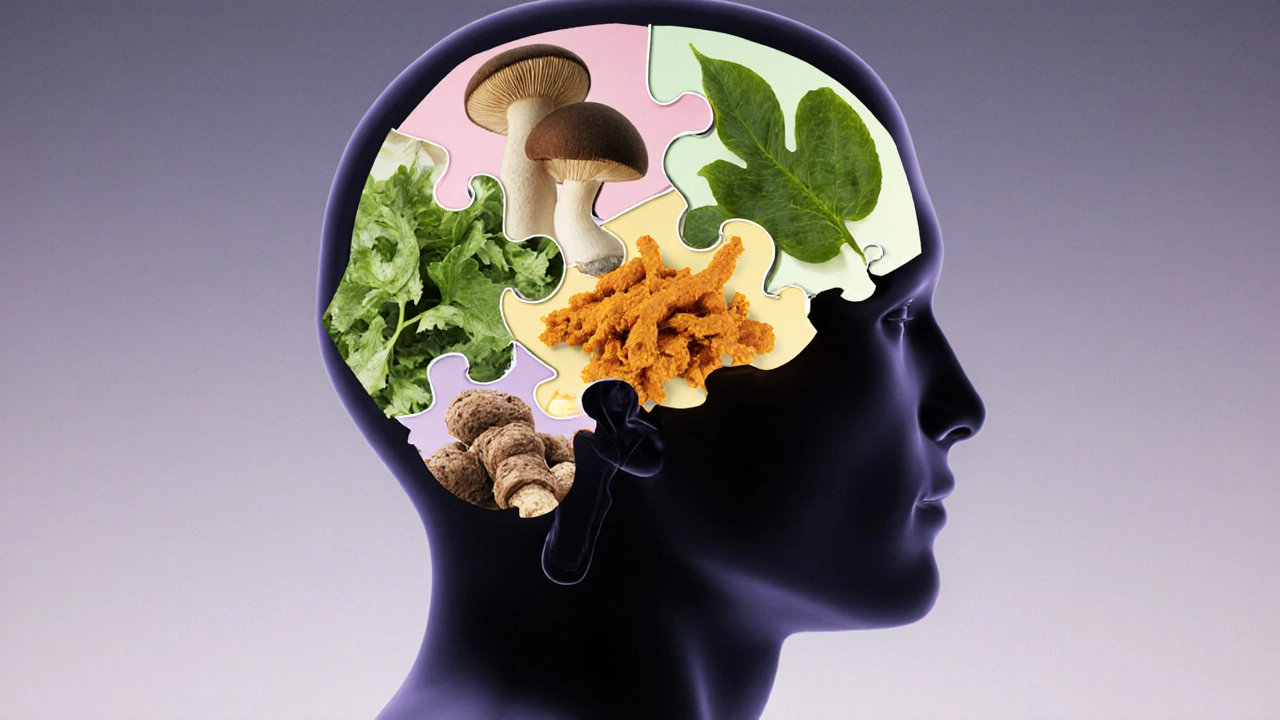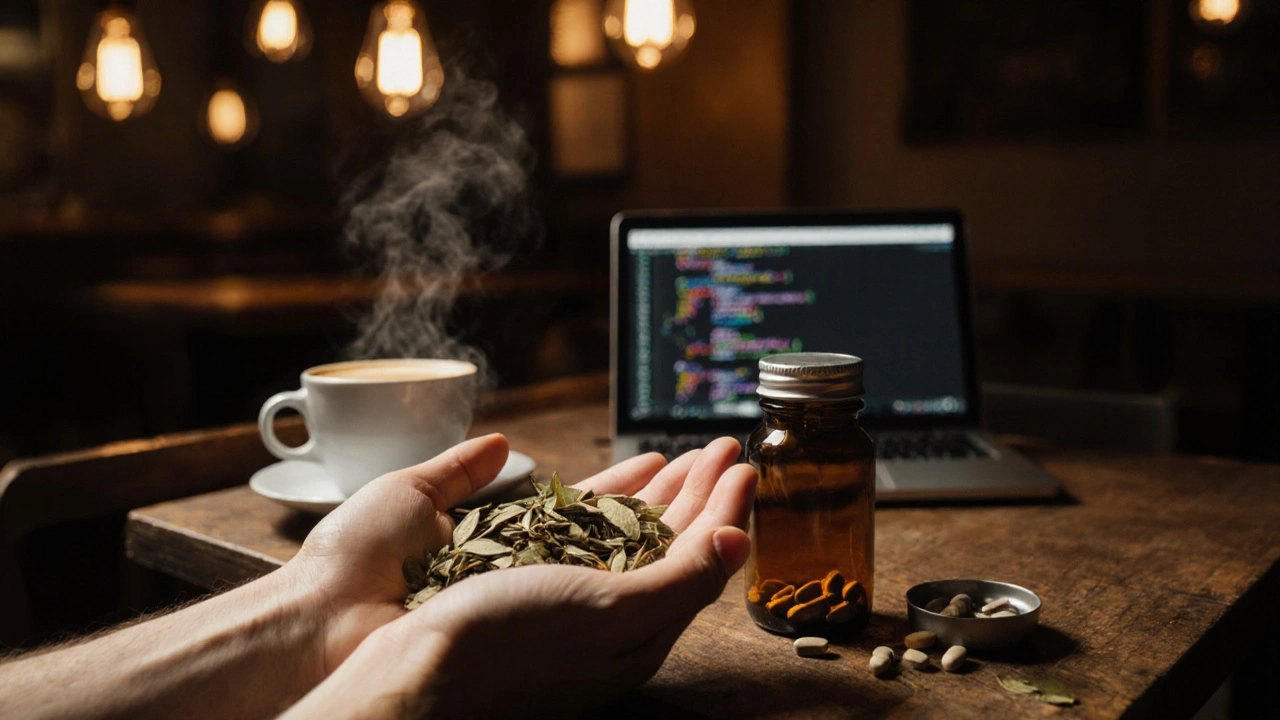Nootropic Herb Selector
Select your primary goal and lifestyle factors to find the best nootropic herb for you.
Your Goals
Lifestyle Factors
Looking for a brain‑boosting herb but not sure whether Brahmi vs alternatives is the right angle? You’re in the right spot. Below you’ll get a side‑by‑side rundown of Brahmi and the most talked‑about substitutes, plus real‑world tips on when each shines.
Key Takeaways
- Brahmi (Bacopa monnieri) excels at long‑term memory retention and stress reduction.
- Ginkgo biloba cuts through mental fog by improving blood flow.
- Rhodiola rosea ramps up energy and resilience during acute stress.
- Ashwagandha (Withania somnifera) offers a calming, hormone‑balancing edge.
- Lion’s Mane (Hericium erinaceus) may support nerve‑growth factors for creative thinking.
What Is Brahmi?
Brahmi is a staple of Ayurvedic medicine, known scientifically as Bacopa monnieri. Its hallmark compounds-bacosides A and B-are credited with enhancing synaptic communication, boosting antioxidant defenses, and lowering cortisol. Clinical trials typically use 300mg of standardized extract per day, with noticeable benefits after 8‑12 weeks of consistent use.
Top Alternatives at a Glance
Before we jump into the deep dive, here’s a quick snapshot of the most common contenders.
- Ginkgo biloba: Improves cerebral blood flow; dose 120‑240mg.
- Rhodiola rosea: Increases stamina and stress tolerance; dose 200‑400mg.
- Ashwagandha (Withania somnifera): Balances cortisol and supports sleep; dose 300‑600mg.
- Lion's Mane (Hericium erinaceus): Promotes nerve‑growth factor (NGF) production; dose 500‑1000mg.
- Phosphatidylserine: Cell‑membrane phospholipid that aids memory recall; dose 100‑300mg.
- L‑Theanine: Amino acid from tea that smooths focus without jitter; dose 100‑200mg.
Deep‑Dive Comparison
| Herb / Compound | Primary Active(s) | Core Benefit | Typical Daily Dose | Onset of Effect | Research Strength |
|---|---|---|---|---|---|
| Brahmi (Bacopa monnieri) | Bacosides A & B | Long‑term memory, stress reduction | 300mg standardized extract | 8‑12 weeks | Strong (multiple RCTs) |
| Ginkgo biloba | Flavonoids, Terpenoids | Quick mental clarity, circulation | 120‑240mg | 2‑4 weeks | Moderate (mixed outcomes) |
| Rhodiola rosea | Rosavins, Salidroside | Energy, resilience to acute stress | 200‑400mg | 1‑2 weeks | Good (controlled trials) |
| Ashwagandha (Withania somnifera) | Withanolides | Calm focus, cortisol balance | 300‑600mg | 3‑6 weeks | Strong (meta‑analysis) |
| Lion's Mane (Hericium erinaceus) | Hericenones, Erinacines | Neurogenesis, creative flow | 500‑1000mg | 4‑8 weeks | Emerging (small studies) |
| Phosphatidylserine | Phospholipid PS | Recall, age‑related decline | 100‑300mg | 2‑4 weeks | Strong (clinical data) |
| L‑Theanine | L‑Theanine | Calm focus, anxiety reduction | 100‑200mg | 30‑60 minutes | Good (well‑controlled) |

When Brahmi Takes the Lead
If your goal is to cement knowledge over months-think exam prep, learning a language, or building a skill set-Brahmi’s slow‑burn nature pays off. Its antioxidant profile also makes it a solid choice for anyone worried about oxidative stress from long screen time.
People prone to cortisol spikes (tight deadlines, high‑pressure jobs) often notice a calmer baseline after a few weeks of Brahmi, thanks to its HPA‑axis modulation.
Scenarios Where an Alternative Might Suit You Better
Need a quick lift before a presentation? Ginkgo biloba or L‑Theanine can deliver sharper focus within an hour.
Feeling drained by mid‑day slump? Rhodiola rosea offers an energy‑boost without the crash of caffeine.
Balancing hormonal stress is your priority? Ashwagandha not only calms the mind but also supports thyroid and testosterone balance.
Looking for creative brainstorming stamina? Lion's Mane may stimulate nerve‑growth factors that help you think outside the box.
Stacking Smartly: Combining Brahmi with Others
Many nootropic enthusiasts pair Brahmi with a fast‑acting agent like L‑Theanine. The combo gives you the immediate calm of L‑Theanine while Brahmi works on the long game.
If you’re already on an adaptogen such as Ashwagandha, start at the lower end of Brahmi’s dose to gauge tolerance. Both herbs influence cortisol, so overlapping too much can lead to excessive sedation for some.
For brain‑health “full‑spectrum” stacks, a typical protocol looks like:
- Morning: 200mg Rhodiola (pre‑workout)
- Mid‑day: 100mg L‑Theanine + 150mg Ginkgo
- Evening: 300mg Brahmi (after dinner)
- Weekly: 500mg Lion’s Mane (cycle 4 weeks on, 1 week off)
This schedule spreads fast‑acting and slow‑acting effects throughout the day, minimizing overlap.
Potential Side Effects & Interactions
While Brahmi is generally safe, a few considerations matter:
- Digestive upset (bloating, nausea) at high doses-split the dose across the day.
- Possible thyroid‑hormone interaction; people on levothyroxine should monitor thyroid labs.
- May potentiate the sedative effect of benzodiazepines or antihistamines.
Ginkgo can thin blood, so avoid it if you’re on anticoagulants. Rhodiola may increase blood pressure in a minority; check your numbers if you have hypertension. Ashwagandha sometimes lowers blood sugar-good for diabetics but watch for hypoglycemia if you’re on insulin.
How to Choose the Right Herb for You
Answer these three quick questions:
- Do you need immediate focus (hours) or long‑term memory (weeks)?
- Is stress the main hurdle, or lack of energy?
- Do you have any medical conditions that might clash with blood‑thinning or hormone‑modulating herbs?
If you answered “memory” and “stress,” Brahmi is the front‑runner. If you answered “energy” and “quick focus,” Rhodiola or Ginkgo take the spotlight. And if hormone balance is a concern, Ashwagandha edges ahead.

Frequently Asked Questions
Can I take Brahmi together with Ginkgo biloba?
Yes, most users combine them safely. Ginkgo offers faster circulation benefits while Brahmi builds memory over weeks. Start with half‑dose Ginkgo and full‑dose Brahmi, and watch for any digestive changes.
How long before I notice Brahmi’s effects?
Clinical studies show measurable improvements after 8‑12 weeks of consistent daily use. Some users report a subtle calm within the first two weeks, but true memory gains need the longer timeline.
Is Brahmi safe for pregnant or nursing women?
Research is limited, so most experts advise caution. If you’re pregnant or breastfeeding, consult a healthcare professional before adding Brahmi to your regimen.
What’s the difference between Brahmi and Bacopa monnieri?
They're the same plant. “Brahmi” is the traditional Ayurvedic name, while “Bacopa monnieri” is the botanical Latin term used in scientific literature and supplement labels.
Can I cycle Brahmi or should I take it forever?
Many users run a 12‑week on, 2‑week off protocol to keep the body responsive. Since Brahmi works via gene expression, continuous use isn’t known to cause tolerance, but a short break can help you assess ongoing benefits.

10 Comments
Bernie TerrienSeptember 30, 2025 AT 09:15
Brahmi’s just the herbal version of slowly stirring honey into your coffee while your brain’s on fire. Give it 8 weeks and suddenly you remember where you put your keys… and your ex’s birthday. 🤓
Jennifer WangOctober 2, 2025 AT 09:04
While the comparative analysis presented is methodologically sound, I must emphasize that clinical efficacy is contingent upon standardized extraction protocols and bioavailability enhancers such as piperine. Without these controls, interstudy variability remains a significant confounder.
stephen idiadoOctober 4, 2025 AT 01:38
Brahmi? More like Brah-mi-ssed opportunity. Ginkgo’s the real MVP-studies funded by Big Ayurveda just don’t want you to know.
Subhash SinghOctober 4, 2025 AT 13:45
Could you please clarify the mechanism by which bacosides modulate synaptic plasticity? Specifically, are the effects mediated through cholinergic pathways, NMDA receptor modulation, or BDNF upregulation? The literature appears inconsistent on this point.
Geoff HerediaOctober 6, 2025 AT 12:51
Who’s really behind this ‘nootropic herb’ hype? I’ve seen this exact chart in a pharmaceutical whitepaper from 2018. They’re testing us. The FDA’s quietly approving these as ‘dietary supplements’ so they can monitor our brainwaves. You’re being tracked.
Tina DinhOctober 7, 2025 AT 06:58
OMG YES 🙌 I stack Brahmi + L-Theanine and now I’m basically a zen hacker 😌🧠✨
Andrew KehOctober 7, 2025 AT 20:10
This is a really balanced breakdown. I’ve tried most of these and found Brahmi works best for me if I’m studying for exams. Just need to be patient.
Peter Lubem AuseOctober 8, 2025 AT 11:36
Let me tell you something real: Brahmi doesn’t just help your memory-it helps your soul. I was drowning in burnout after my startup collapsed, and after 10 weeks of 300mg daily, I didn’t just remember my kid’s teacher’s name-I remembered why I started working in the first place. The bacosides don’t just cross the blood-brain barrier, they cross the barrier between exhaustion and meaning. Don’t treat this like a supplement. Treat it like a ritual. Take it after dinner. Sit in silence. Breathe. Let it work. It’s not magic-it’s medicine with patience.
linda woodOctober 9, 2025 AT 20:10
Wow, so Brahmi’s the slowest but ‘strongest’? Guess I’ll just wait 3 months to stop forgetting where I put my coffee mug… 🙄
LINDA PUSPITASARIOctober 10, 2025 AT 01:52
I’ve been taking Ashwagandha for anxiety and added Brahmi last week and my sleep is better and I’m not as jumpy during Zoom calls 🤗 also I think my cat notices I’m calmer now she sleeps on my lap more 😴🐾